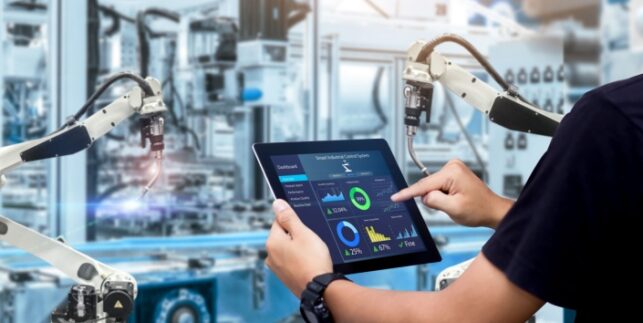Plastic Manufacturing Data Collection: Enabling Data-Driven Manufacturing

Plastics manufacturers are increasingly interested in implementing Industry 4.0 best practices within their factories, recognizing the many benefits it may have on their operations and profitability.
However, plastics manufacturers often struggle with implementing data collection procedures that are robust enough to help them address key concerns within their industry. Access to extensive amounts of integrated, real-time data is essential to forming a complete picture of factory operations that can be used to power Industry 4.0 solutions.
To better illustrate this point, let’s examine the specific challenges plastics manufacturers are facing, why isolated data points are not enough to address these issues, and what outcome manufacturers can expect with a smart plastics software solution in place.
Data Collection Challenges in the Plastics Industry
Plastic manufacturing data collection is complex due to the number of sources from which data must be collected, the type of metrics and processes, and the need to aggregate them all continuously, analyze them in real-time, and get dynamic insights based on this data.
Some of the top concerns plastic manufacturers have yield a tremendous amount of data such as:
Materials Management
Recipe and materials management is a major concern for plastics factories. With so many different materials to keep track of, ensuring that there is always enough of all necessary materials (including the correct proportions of colorants) available during each particular product run can be challenging.
To manage this problem effectively, plastics manufacturers need to know what materials are currently being used and how quickly they are consumed. They also need to keep a running tally of the material left in storage, so planners know when to order more.
Quality Control Processes
Another top concern for plastic manufacturers is the QC process due to the many potential points of failure involved. For example, even a slight deviation from the prescribed pellet ratios may result in a run of products that are not the intended color and must be discarded. Improper heating or cooling can also ruin a run, as can molds that leave too much flash on a product to be cleanly removed.
Plastics manufacturers need ongoing access to many different quality control metrics, such as the yield, scrap, and defect rates. They also need the ability to break these metrics down by shift, machine, worker, and other relevant variables to discover meaningful trends in the data.
Maintenance
In addition to the machinery present in all factory settings, manufacturers in the plastics industry must maintain several sets of custom molds. If a mold is not in good condition at the start of a production run, none of the products from that run will pass quality control standards.
These increased demands on plastic factories’ technician crews may lead to difficulty coordinating maintenance at the appropriate times. Facilities need a way to easily track and schedule maintenance rounds to ensure that every asset receives regular attention and is kept in peak condition.
Sustainability
In 2018, the US added another 27 million tons of plastic to their landfills. Most developed countries are not too far behind. Because plastics are not biodegradable, there is immense social and regulatory concern around waste in the plastics production process.
Although all factories benefit from attaining greater production efficiency, this dynamic gives plastics manufacturers additional pressure to minimize waste as much as possible. To do this, they need production data collection solutions that allow them to streamline their operations as much as possible.
Getting the Data You Need
Many of the top concerns manufacturers have can be alleviated with sufficient access to production data. However, the keyword here is “sufficient” – how much data is enough?
Sometimes data doesn’t tell the whole story. For instance, it is always useful to know when a machine breaks down and how often this happens. Even 20-year-old ERP solutions can tell you things like this, and that level of intelligence was revolutionary at the time.
But what if you had access to time-specific data on machine output, QC metrics, maintenance schedules, materials use, and other factors that may have played a role in the stoppage event? Suddenly, it becomes much easier to trace the reasons why that event occurred and make changes to prevent it from happening again in the future.
This level of detail is possible with modern data collection processes and Real-time Operational Intelligence (RtOI) solutions.
RtOI solutions allow manufacturers to collect and aggregate data from multiple sources, including:
- Production sensors
- Customer Management Systems (CMS)
- Human resources systems
- Materials logs
- Dosing systems
- Enterprise Resource Planning (ERP) software
Once all of this data has been assembled and sorted, it is automatically analyzed and put into context against previous trends in the same data. Managers, technicians, and other users can use this information to immediately make relevant decisions and act quickly when it matters most.
Overcoming Organizational Silos
When organizations have data spread over multiple solutions, there is an increased risk of information becoming siloed within a single program or department. This is heightened by the fact that information often arrives fragmented and in batches or at specific intervals rather than as a continuous stream.
Without the ability to access real-time information from any of the factory’s data sources, facilities cannot progress to true modern digital manufacturing.
Real-time manufacturing data collection is the next step in the digitalization hierarchy.
Real-time information gives manufacturers ultimate insight into everything happening on the factory floor at any given moment. This enables shifting from reactive post-mortem analysis to proactive operational strategies and incident prevention. In other words, it gives facilities the power to stay one step ahead at all times.
To truly harness the power of Industry 4.0 and production data collection, manufacturers need to pull real-time data from a variety of sources, including:
- CMS.
- ERP solutions.
- MES solutions.
- Machine sensors and scanners.
- Dosing systems.
- Operator inputs.
The more data you can collect, the more you will optimize your factory’s operations. As long as you have a capable RtOI solution to help analyze information in real-time and provide decision-ready insights that can be used to automate tasks and drive action, there is no such thing as too much information.
What Better Data Can Do for Plastics Manufacturing
To better understand why greater access to more real-time data is helpful during plastics production, let’s take a closer look at what plastics manufacturers can do with comprehensive data collection solutions in place.
Contextualize Incoming Orders in Terms of Urgency
With real-time data on hand, managers can use plastic manufacturing software to coordinate production based on expected lead times for different clients. This optimizes scheduling and ensures that the facility is always working toward its most pressing objectives.
Track Materials Use Based on Up-to-the-Minute Production Speeds
Plastics production monitoring ensures that the machines never run out of the materials they need to keep production going. Thanks to alert systems, each machine can be continuously restocked with materials on a just-in-time basis.
Highlight Inefficient Processes and Resource Waste
Combining production data and analytics makes it easy to pinpoint areas where resources are not used optimally. Managers can then take steps to correct these problems.
Real-time modification of resources produces clear savings in terms of physical waste such as scrap, but can also apply to intangible sources of waste such as inefficient energy use and staffing schedules. All of these changes will eventually add up to a significant improvement in OEE.
Identify Opportunities to Cut Costs
Many of the overhead costs that factories incur can be reduced or avoided with process optimization.
Reducing material and labor ineffiecines directly impacts the bottom line; however, there are other actions that managers can take to lead to indirect savings. For example, predictive maintenance can prevent molds and machines from deteriorating, leading to lower costs and a healthier bottom line over time.
Automate Predictable Processes
When certain actions must be carried out every time a particular data threshold is reached (for instance, a QC review after a scrap rate spike), there is no need for a human worker to initiate that action.
With enough data and a capable software solution, you can automate these processes and minimize the need for human oversight during production.
Intervene Appropriately in Crisis Situations
Crises can have a rippling effect if not identified and treated quickly and efficiently.
RtOI solutions can leverage real-time data be trigger alerts that prompt quick action when these urgent situations come up – and with predictive analysis tools, it is often possible to avoid these issues altogether.

Changing the way people work in factories
Request a DemoUpgrade to Data-Driven Plastics Manufacturing
Real-time holistic data collection is a game-changer for plastic manufacturers. By arming themselves with information from their own software solutions and production lines, plastics manufacturers can give themselves the tools they need to tackle the sector’s most pressing problems.
Are you ready to take your factory to the next level? Matics can help! We are a leading RtOI solution provider that specializes in using cutting-edge data solutions to address industrial concerns. Our Real-Time Operational Intelligence (RtOI) solution integrates real-time data from all available sources to break down knowledge silos and consolidate production information on one easy-to-use platform.
Contact us today to book a demo of our industry-leading manufacturing software and see how it could help you bring the many benefits of Industry 4.0 to your factory floor.




